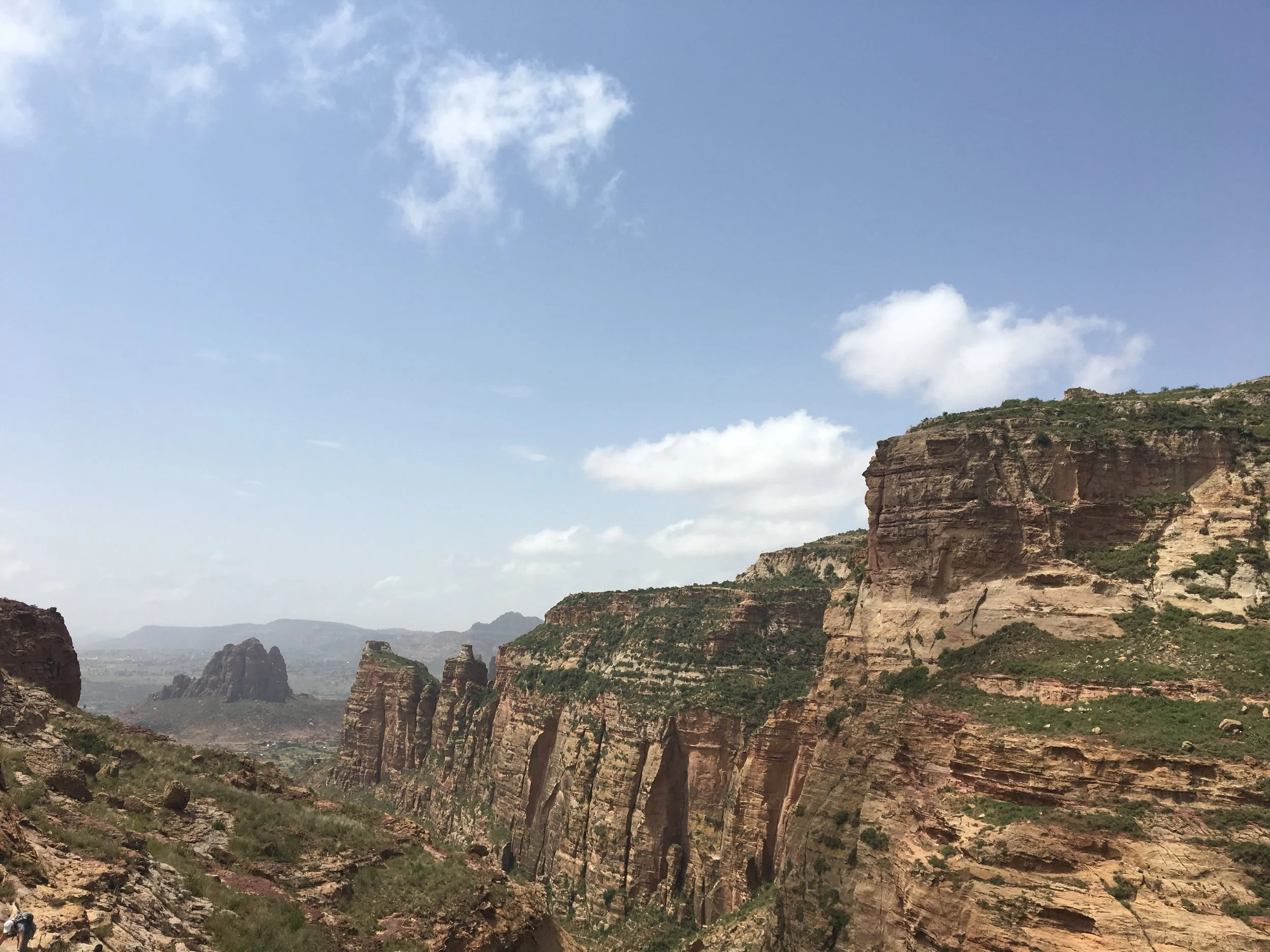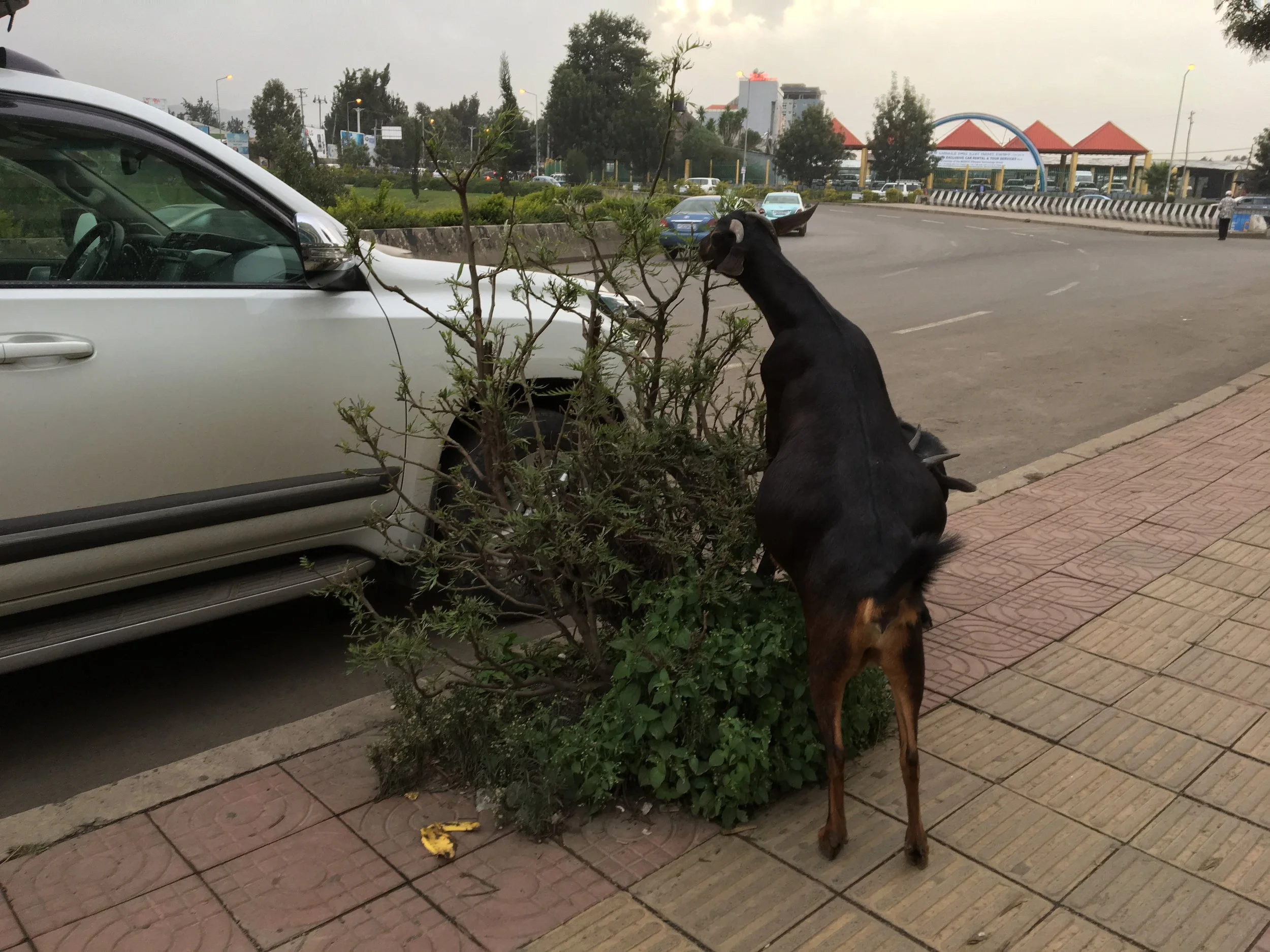The First Month—Meskerem/September
“Floods recede. Yellow masqal daisies cover the land. New and fallow fields ploughed for cultivation.”—The Wife’s Tale
Sworn in! Two years of service begins. On the one hand two years of service feels daunting, and on the other it feels totally doable, both of which is a bit disquieting at times.
People in town greet me, wave me down to ask who I am, what I’m doing here. Lili ibalalahu, ingliziña astamari nän, I say (My name is Lili, I’m an English teacher). A woman invited me into her bread shop where she sells the most delicious biscuits which she served me with buna (coffee).
Market days: women with neat piles of what they are selling—garlic, onions, tomatoes, spinach, salt, spices, eggs. They wear big, straw hats to protect against the sun. One woman in particular has perfect little mounds of the whitest garlic. A woman sold me a bunch of fresh rosemary for 2 birr and gave me Adam’s leaf, a bitter herb usually infused in tea. There are donkeys everywhere, glad to have the heavy loads they carried off their backs; cows, ox, sheep, and goats are for sale—it seems they already know the slaughter that lies ahead as they bleat and bellow. They sell things the way they’ve been sold for centuries—people haggle and bargain—everything is organized by category and you can smell garlic, rosemary, manure, mud, livestock, and arake (a moonshine) which women keep in yellow gerry cans.
One night I walked the length of town with two of the girls from my compound. It’s the equivalent to hanging out on the Malécon in Havana. Young people flirt and hang out, couples walk leisurely. Sambusas (delicious fried things stuffed with lentils) are sold on the roadside to eat. We walked past palm trees, eating cookies, the two girls giggling. I looked up at the stars, they are so incredibly bright here, I could see the milky way, constellations, and distant planets.
There are monkeys that slowly amble across the road or hop on the roofs of our compound, hyenas that make whooping sounds in the night, and sweet little donkeys everywhere.
I am constantly in awe of Ethiopian women. They do so much and are always so generous. I’ve already been taken in by so many women in my first few months who’ve been patient mothers and sisters. There are two women in my compound who run things, Brike, the matriarch who commands the room when she enters, and is effortlessly elegant all the time, and her daughter Mimi. Both of them have striking cheek bones and are intimidatingly beautiful.
My new best friend is a 10-year-old boy named Geta, he is Mimi’s son. He is in fourth grade and lives in my compound. We play; ping pong with a paint can lid and biscuit tin lid for paddles, marbles and jump rope together, and Geta helps me cook my dinner which we usually share together. I’ve introduced Geta to peanut butter and he is a fan. I showed him how to eat it with bananas, slicing the banana down the middle and slathering it with peanut butter. Later, he asked me if you could eat peanut butter with oranges. I said no (yuck!), but maybe we’ll try it.
Celebrations
I’ve been fortunate to be included in many celebrations in my first month at site. Here are my journal entries reflecting on my experiences of each of them:
The New Year
Happy New Year! Today is the Ethiopian New Year—it is 2011. Today is 9/11/18. I believe it is September 1st or so in the Ethiopian Calendar. Still, I’ve been reflecting on having a holiday celebrating a time for new beginnings, for change, for hope, on a date that most Americans now associate with tragedy. It’s nice to see this day differently.
This morning I joined my land family for buna and a savory porridge, traditionally eaten during celebrations. Then they brought a sheep into the living room (yes, in the living room) and said a blessing. Then they took the sheep outside and slaughtered it. I knew it was coming, but still was a little remorseful. Seeing what you’ll eat later while it’s still alive gives you some perspective.
I want to hold onto the image of the elder woman dressed in white (her shalls wrapped around her), sitting next to the sheep as she blessed it, against the dark blue wall in the living room.
For mïsa (lunch) I finally had doro wat—my first time having this famed dish since arriving in Ethiopia. It’s a stew made with chicken and hard boiled eggs in a tangy, sweet sauce. I also had kočo—made from the false banana plant, a sour fermented type of bread. I also ate kitfo—a dish made of raw meat which we’ve been warned against eating, but so far I’ve survived.
I like that the new year is celebrated all day long (as opposed to the western New Year’s Eve, where it’s all about the stroke of midnight and then it’s over). I even heard some very early revelers after this morning’s call to prayer.
A Wedding
I was reading The Wife’s Tale which begins with a wedding in Ethiopia when Geta quietly walked into my room, “nay,” he said. He was summoning me somewhere. I noticed he was well dressed in traditional Ethiopian clothes so I started to change into a skirt but could tell by his expression that wasn’t what I needed. He gestured to his clothes. I held up my Habesha dress. “Yes,” he said. Quickly, I threw it on and we walked down the road and into a tent where there was a wedding reception! I was unsure whose wedding it was. There was a lot of food and drink. Most of the women were dressed traditionally so I was glad to have my Habesha dress. There was beautiful singing and drumming, and of course dancing. At one point it became a sort of primal drumming with animal type grunts and intense dancing.
Wedding day two: More food, dancing, singing. Today I was with just the women, also an Ethiopian tradition for the men and women to celebrate separately on the second day. We ate the savory, ceremonial porridge, there was more praying, drumming, and dancing. At one point I was invited to come up and dance with the women, unfamiliar with Ethiopian style of dance I fumbled along, afterwards a woman put her hands to her heart and thanked me. I felt grateful to be included in this special tradition.
Wedding day three: There’s been white strips of paper strewn on the ground for the last three days and you can see the paths people walked home marked by strips of paper from the tent. I watched the women chop the cooked meat for the final dinner—they used knives I’ve seen here that look like a cross between a scythe and a machete. I’m sure it’s the same type of knife they’ve used in Ethiopia for centuries, along with the massive hand-made cutting boards. Tradition is strong and important here. I helped the women dry the plates as we prepared for dinner. More food, drink, dancing, and praying.
Meskel—Feast of the Finding of the True Cross
Meskel celebrates the finding of the cross, believed to be the cross on which Christ was crucified. It is said that it was discovered underneath a fire so the tradition is to light bonfires. With the arrival of Meskel is the end of “kerempt” the rain season.
On the first day we ate meat (I think goat) and kitfo (I had a cooked version this time). Then there was a buna ceremony, we had buna with butter, salt, and milk.
On the second day we had a late lunch of messr wat (lentils) and dinič (potatoes) followed by the most delicious hambasha (a traditional Ethiopian bread), there was a special prayer said over it before we ate. Afterwards, we drank buna and ate popcorn. Then I was told to put on my “habesha libs” to go to church.
The outdoor grounds of the church were crowded, mostly with women wrapped in white, circled around the priests who were performing a traditional ceremony—they danced raising their staffs into the air women clapped and trilled “ilililili!” There were prayers said and young boys running around shooting off rockets and fireworks. Then it was time to light the first bonfire—the priests led the procession, men carried bound Eucalyptus branches lit to make torches and threw them into the pyre of sticks. It burned quickly sending sparks into the air the looked like fireflies aglow against the dark sky. Two young girls came over to me, curious about who I was. They were too small to see the bonfire so I took turns lifting them up so they could see. I ran into a woman I knew from my compound, she gave me four kisses on each cheek—the moment of running into someone I knew in a still unfamiliar place made me feel a part of something. It was both a joyful and peaceful ceremony. Beautiful.
Afterwards we went home to light our own bonfire. The women trilled while the men circled around with their torches uttering a prayer. They threw the torches into the pyre and again it quickly lit up the night. We sat (benches were brought out) watching the fire burn. Hambasha and tej were served. Men and boys came around dancing and singing using a gerry can as a drum. As others lit their bonfires sparks would shoot up into the dark like a flare. The moon was almost full, banana trees silhouetted in the milky light. I sat watching the fire die out—another prayer was said and a small glass of red wine was had. We had dinner and buna and then I went to sleep.
A Funeral
I went to a mourning ceremony. I’m still amazed by Ethiopians generosity to let a foreigner join for such an intimate event. Traditionally the men and women sit separately and talk quietly or are silent. A meal is served and once you’ve paid your respects you may leave. Women sometimes keel when they arrive to show remorse. I sat with the women, covering our feet as is custom, it was so nice to sit amongst the women eating and chatting quietly, watching the dogs run outside, the men playing cards, and chickens pecking on the ground.


